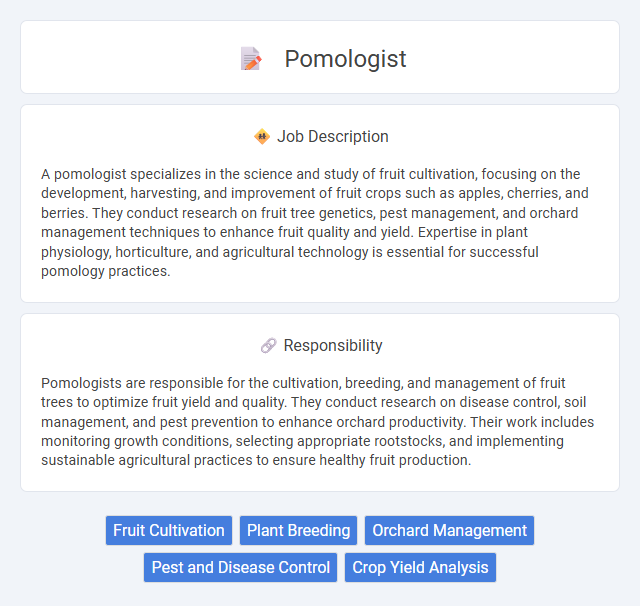
A pomologist specializes in the science and study of fruit cultivation, focusing on the development, harvesting, and improvement of fruit crops such as apples, cherries, and berries. They conduct research on fruit tree genetics, pest management, and orchard management techniques to enhance fruit quality and yield. Expertise in plant physiology, horticulture, and agricultural technology is essential for successful pomology practices.
Individuals with a strong interest in horticulture and a passion for fruit cultivation will likely find a career as a pomologist rewarding. Those who enjoy working outdoors and possess analytical skills to study plant diseases and growth conditions are generally well-suited for this profession. People who prefer routine office work and have limited physical stamina might face challenges adapting to the demands of this role.
Qualification
A Pomologist typically holds a degree in horticulture, agriculture, or plant science, with specialized training in fruit cultivation and orchard management. Expertise in plant physiology, pest control, and soil science is essential for effective crop production and disease prevention. Advanced qualifications often include experience with genetic improvement techniques and proficiency in using agricultural technology to optimize fruit quality and yield.
Responsibility
Pomologists are responsible for the cultivation, breeding, and management of fruit trees to optimize fruit yield and quality. They conduct research on disease control, soil management, and pest prevention to enhance orchard productivity. Their work includes monitoring growth conditions, selecting appropriate rootstocks, and implementing sustainable agricultural practices to ensure healthy fruit production.
Benefit
A pomologist likely benefits from in-depth knowledge of fruit cultivation, enhancing fruit quality and yield. This expertise may increase agricultural productivity and contribute to sustainable farming practices. Their skills probably support innovation in fruit varieties, offering economic advantages to growers and consumers.
Challenge
A pomologist faces the challenge of managing diverse fruit crops while adapting to rapidly changing climate conditions that affect growth cycles and pest prevalence. The probability of encountering new diseases or pests requires constant research and implementation of innovative cultivation techniques. Balancing productivity with sustainable practices adds complexity to their decision-making process.
Career Advancement
Pomologists specializing in the study and cultivation of fruit trees can advance their careers by gaining expertise in plant genetics, pest management, and sustainable agriculture techniques. Progression often involves roles such as research scientists, agricultural consultants, or farm managers, enabling influence over crop production and quality improvements. Advanced degrees and certifications in horticulture or agricultural science significantly enhance opportunities for leadership positions within agricultural companies or research institutions.
Key Terms
Fruit Cultivation
Pomologists specialize in fruit cultivation by studying the genetics, growth, and diseases of fruit-bearing plants to improve yield and quality. They apply advanced techniques in grafting, pruning, and pest management while conducting research on soil conditions and climate impacts. Expertise in selecting optimal varieties and sustainable practices ensures healthy orchards and profitable fruit production.
Plant Breeding
Pomologists specializing in plant breeding focus on developing new fruit cultivars with enhanced disease resistance, improved yield, and superior flavor profiles. They employ techniques such as cross-pollination, genetic selection, and biotechnological tools to create variants adapted to different climatic conditions and market demands. Expertise in plant genetics and horticultural practices is essential for successful cultivar innovation and sustainable orchard management.
Orchard Management
Pomologists specializing in orchard management apply scientific principles to optimize fruit tree cultivation, focusing on soil health, irrigation, pruning, and pest control to enhance yield and fruit quality. They conduct systematic monitoring and utilize advanced technologies like precision agriculture to manage orchard ecosystems efficiently. Expertise in cultivar selection and disease prevention schemes is critical for maintaining sustainable production and market competitiveness.
Pest and Disease Control
Pomologists specializing in pest and disease control focus on identifying, managing, and preventing infestations and infections that threaten fruit crops. They utilize integrated pest management (IPM) techniques, including biological controls, chemical treatments, and cultural practices to maintain orchard health and optimize yield quality. Advanced monitoring systems and resistant fruit varieties are key components in reducing damage caused by pests and diseases in pomology.
Crop Yield Analysis
Pomologists specializing in crop yield analysis use advanced techniques to assess fruit production efficiency and identify factors influencing growth. They employ data-driven methods such as phenotyping, soil analysis, and climate monitoring to optimize orchard management and improve harvest quality. Their expertise directly contributes to maximizing yield potential and sustainable fruit cultivation.
 kuljobs.com
kuljobs.com